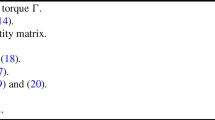Abstract
This paper presents a novel learning feed-forward controller design approach for accurate robotics trajectory tracking. Based on the joint nonlinear dynamics characteristics, a model-free learning algorithm based on Support Vector Machine (SVM) is implemented for friction model identification. The experimental results verified that SVM based learning feed-forward controller is a good approach for high performance industrial robot trajectory tracking. It can achieve low tracking error comparing with traditional trajectory tracking control method.
Preview
Unable to display preview. Download preview PDF.
Similar content being viewed by others
References
Ozaki, H., Iwamura, K.M., Lin, C.J., Shimogawa, T.: Improvement of Trajectory Tracking for Industrial Robot Arms by Learning Control with B-Spline. In: Proceedings of the IEEE International Symposium on Assembly and Task Planning, pp. 264–269 (2003)
Vapnik, V.: Statistical Learning Theory. Wiley, New York (1998)
Kruif, B.J., de Vries, T.J.A.: On Using a Support Vector Machine in Learning Feed-Forward Control. In: Proceedings of the IEEE/ASME International Conference on Advanced Intelligent Mechatronics, Como, Italy, pp. 272–277 (2001)
Pontil, M., Verri, A.: Support Vector Machines for 3D Object Recognition. IEEE Transaction on Pattern Analysis and Machine Intelligence 20, 637–646 (1998)
Vanderbi, R.J.: LOQO: An Interior-Point Code for Quadratic Programming. TRSOR-94-15, Statistics and Operations Research, Princeton University (1994)
Armstrong, H.B.: Control of Machines with Friction. Kluwer Academic, Boston (1991)
Author information
Authors and Affiliations
Editor information
Editors and Affiliations
Rights and permissions
Copyright information
© 2005 Springer-Verlag Berlin Heidelberg
About this paper
Cite this paper
Bi, D., Wang, G.L., Zhang, J., Xue, Q. (2005). Novel Leaning Feed-Forward Controller for Accurate Robot Trajectory Tracking. In: Wang, L., Chen, K., Ong, Y.S. (eds) Advances in Natural Computation. ICNC 2005. Lecture Notes in Computer Science, vol 3611. Springer, Berlin, Heidelberg. https://doi.org/10.1007/11539117_39
Download citation
DOI: https://doi.org/10.1007/11539117_39
Publisher Name: Springer, Berlin, Heidelberg
Print ISBN: 978-3-540-28325-6
Online ISBN: 978-3-540-31858-3
eBook Packages: Computer ScienceComputer Science (R0)




